小学六年级英语总复习-介词
六年级小升初英语复习专项训练--介词 通用版(含答案解析)

17.—Where are the fruits, please?—________.
A. It's on Shelf A
B. They're on Shelf A
18.It rained all day ____ 12th April.
C. It's on the Shelf A
A. at
B. in
三、填空题
26.翻译词组。 ①在春天________ ②放风筝________ ③在夏天________ ④去游泳________ 27.Bobby usually goes to school________bike, but he always sits ________the basket. 28.I watch TV________eight________the morning.
A. on
B. in
4.She to work car.
A. goes, by
B. goes, on
5.Jack is watching a bird _____ the grass.
A. at
B. in
6.I went to the zoo ___ bus yesterday.
A. on
B. at
五、翻译
41.农场里没有鸭子。 ________ ________ any ducks ________ the farm. 42.我们把我们的礼物放在树的下面。
We________ ________presents________the tree. 43.沿着这条路走,电影院在你的左边。 Go ________ this street , the cinema is on your ________.
总复习-方位介词(课件)-人教PEP版英语六年级下册

当堂练习2——读一读,选一选
1. I water the sprout and put it _____ the sun.
A. under
B. on
C. in
D. at
2. Look at that girl ______ red.
A. in
B. for
C. of
D. with
3. We have music class ______ Monday morning.
half past ten. 6. There is a bridge (on, over, in) the river. 7. Tom is (between, behind, in front of) Jack and David.
Keys: 1. in 2. on 3. in 4. on 5. at, at 6.over 7. between
方位介词篇
方位介词详解
on(有接触面) above over(垂直上方) under(垂直下方) below
有接触面,“在...上”
on
桌上有一本书。 There is a book on the desk.
above
无接触面,“在...上方”
over(垂直上方)
eg:The bird is flying above m e .T h e b r i d g e i s o v e r t h e r i v e r.
C. in, with D. on, with
7. The first astronaut landed on the moon _____ 1968.
• on
B. in
C. at
D./
六年级英语语法复习介词
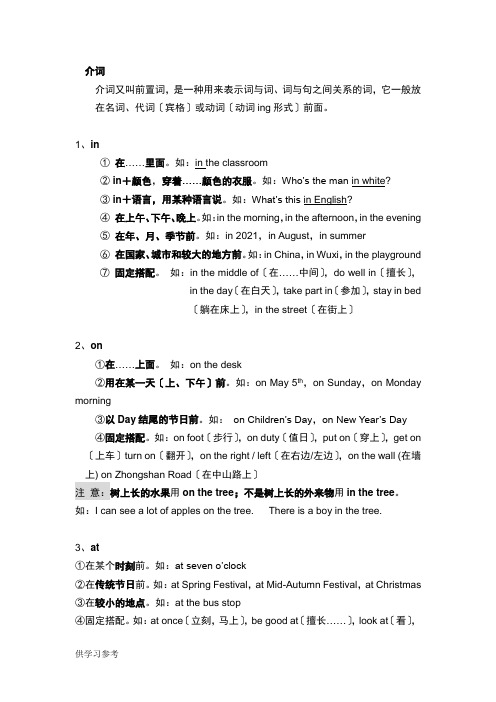
介词介词又叫前置词,是一种用来表示词与词、词与句之间关系的词,它一般放在名词、代词〔宾格〕或动词〔动词ing形式〕前面。
1、in①在……里面。
如:in the classroom②in+颜色,穿着……颜色的衣服。
如:Who’s the man in white?③in+语言,用某种语言说。
如:What’s this in English?④在上午、下午、晚上。
如:in the morning,in the afternoon,in the evening⑤在年、月、季节前。
如:in 2021,in August,in summer⑥在国家、城市和较大的地方前。
如:in China,in Wuxi,in the playground⑦固定搭配。
如:in the middle of〔在……中间〕,do well in〔擅长〕,in the day〔在白天〕,take part in〔参加〕,stay in bed〔躺在床上〕,in the street〔在街上〕2、on①在……上面。
如:on the desk②用在某一天〔上、下午〕前。
如:on May 5th,on Sunday,on Monday morning③以Day结尾的节日前。
如:on Children’s Day,on New Year’s Day④固定搭配。
如:on foot〔步行〕,on duty〔值日〕,put on〔穿上〕,get on 〔上车〕turn on〔翻开〕,on the right / left〔在右边/左边〕,on the wall (在墙上) on Zhongshan Road〔在中山路上〕注意:树上长的水果用on the tree;不是树上长的外来物用in the tree。
如:I can see a lot of apples on the tree. There is a boy in the tree.3、at①在某个时刻前。
六年级英语知识点介词大全

六年级英语知识点介词大全介词在英语语法中扮演着非常重要的角色,它们用来表示名词或代词与其他词之间的关系。
在六年级的英语学习中,掌握各种常用的介词及其用法是非常重要的。
本文将介绍六年级英语知识点中常用的介词大全。
1. 关于地点和位置:在(in)、在…上(on)、在…下(under)、在…里面(inside)、在…旁边(beside)、在…前面(in front of)、在…后面(behind)、在…之间(between)、在…之上(above)、在…之下(below)、在…之内(within)等。
例如:- The book is on the table.(这本书在桌子上。
)- The cat is under the chair.(猫在椅子下。
)- The dog is inside the house.(狗在屋子里。
)2. 关于时间:在…时候(at)、在…之前(before)、在…之后(after)、在…期间(during)、在…的时候(while)、从…到…(from…to)、自从…以来(since)、在…之内(within)、在…之外(outside)等。
例如:- I will see you at 8 o'clock.(我会在8点钟见你。
)- The party will start after lunch.(聚会将在午餐后开始。
)- I have been here since morning.(我从早上开始就一直在这里。
)3. 关于原因:因为(because of)、由于(due to)、为了(for)、由于…而(as a result of)、由于…所以(as a result)、得益于(owing to)等。
例如:- He couldn't come because of the heavy traffic.(他因为交通拥堵而无法来。
)- She bought a new dress for the party.(她为了聚会买了一条新裙子。
小学六年级英语语法:介词短语的运用
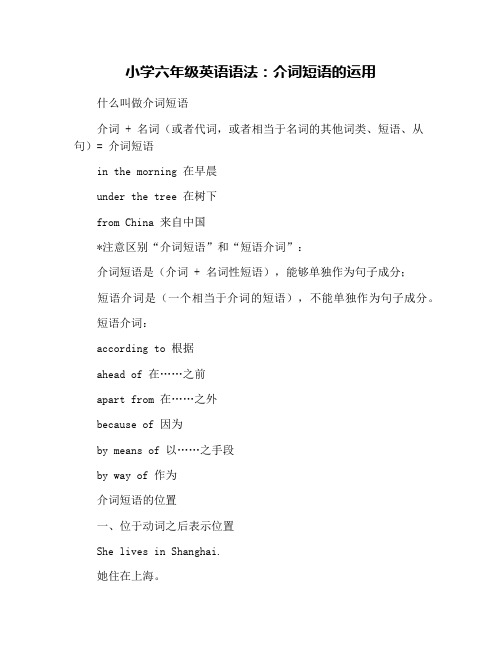
小学六年级英语语法:介词短语的运用什么叫做介词短语
介词 + 名词(或者代词,或者相当于名词的其他词类、短语、从句)= 介词短语
in the morning 在早晨
under the tree 在树下
from China 来自中国
*注意区别“介词短语”和“短语介词”:
介词短语是(介词 + 名词性短语),能够单独作为句子成分;
短语介词是(一个相当于介词的短语),不能单独作为句子成分。
短语介词:
according to 根据
ahead of 在……之前
apart from 在……之外
because of 因为
by means of 以……之手段
by way of 作为
介词短语的位置
一、位于动词之后表示位置
She lives in Shanghai.
她住在上海。
The children are playing in the street now.现在孩子们在街上玩。
二、位于动词之后表示方向
He went into the kitchen.
他到厨房里去。
三、位于句首表示突出、对照
In the garden everything was so beautiful.花园里一切都是那么美丽。
四、位于句首,倒装主谓
Behind me lay the fields.
在我的后面是一片田野。
On the desk is a bag.
桌子上有一个袋子。
五、位于名词之后,用于限制前面的名词
The apple on the plate is for you.
盘子上的苹果是给你的。
介词专项复习(课件)通用版英语六年级下册
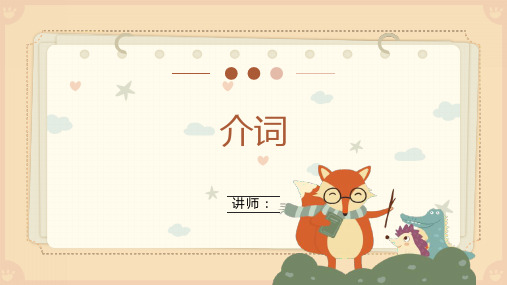
PART 03
表示原因
01
at 表示某种起因,与”喜、怒、吃惊”等词连用 You look very surprised at the news.
with 表示某种心理的原因 The boy ran away with sadness.
for
“因为,由于”表示为了某一目的的原因 I forgave him for his sincere attitude.
with
with + 工具 They cut the tree with knives.
in in + 某种语言 Mary made a speech in English.
02
as 表示“以/作为......的身份/资格/角色” He studied abroad as an exchange student.
03
below
表示“低于某物”(只表示位置低) The village is below the top of the mountain.
above
表示“在......的上方”(与below相对) above the mountain
04
between
表示“在......之间”(两者) I’m usaually busy between Monday and Friday.
04
till/until
表示“表示直到......” ①在肯定句中,需要与延续性动词连用
Let’s wait until the rain stops. ②在否定句中,常与与非延续性动词连用
I didn’t go home until the rain stoped.
by
“到......以前” “不迟于” “到……时(为止)” I must finish my homework by tomorrow.
小学六年级英语介词知识点及练习题
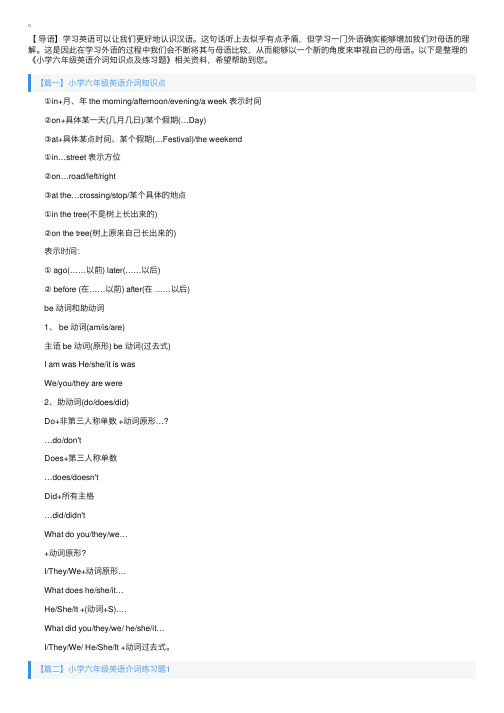
【导语】学习英语可以让我们更好地认识汉语。
这句话听上去似乎有点⽭盾,但学习⼀门外语确实能够增加我们对母语的理解。
这是因此在学习外语的过程中我们会不断将其与母语⽐较,从⽽能够以⼀个新的⾓度来审视⾃⼰的母语。
以下是整理的《⼩学六年级英语介词知识点及练习题》相关资料,希望帮助到您。
【篇⼀】⼩学六年级英语介词知识点 ①in+⽉、年 the morning/afternoon/evening/a week 表⽰时间 ②on+具体某⼀天(⼏⽉⼏⽇)/某个假期(…Day) ③at+具体某点时间、某个假期(…Festival)/the weekend ①in…street 表⽰⽅位 ②on…road/left/right ③at the…crossing/stop/某个具体的地点 ①in the tree(不是树上长出来的) ②on the tree(树上原来⾃⼰长出来的) 表⽰时间: ① ago(……以前) later(……以后) ② before (在……以前) after(在 ……以后) be 动词和助动词 1、 be 动词(am/is/are) 主语 be 动词(原形) be 动词(过去式) I am was He/she/it is was We/you/they are were 2、助动词(do/does/did) Do+⾮第三⼈称单数 +动词原形…? …do/don't Does+第三⼈称单数 …does/doesn't Did+所有主格 …did/didn't What do you/they/we… +动词原形? I/They/We+动词原形… What does he/she/it… He/She/It +(动词+S)…. What did you/they/we/ he/she/it… I/They/We/ He/She/It +动词过去式。
【篇⼆】⼩学六年级英语介词练习题1 ( ) 1. Why did you get up so early ___ this morning.A. onB. /C. atD. in ( ) 2. He went to Shanghai___ September 3, 1991 and came back___ a cold morning last year.A. in; onB. on; inC. on; onD. in; ia ( ) 3. Lucy was born____ the night of May 12, 1984.A. onB. inC. atD. to ( ) 4. Mrs Brown came to China ____ 1996.A.onB. ofC. toD. in ( ) 5 ___ the morning of November 20, 1915, the workers came to Chicago to show their mourning of Joe Hill.A. OnB. InC. OnD. At ( ) 6. Ann moved___Hangzhou___September, 1992.A. /; inB. to; inC. to; on D, in; in ( ) 7. They started off___an autumn afternoon.A. duringB. atC. inD. on ( ) 8. He often goes ____ school ____ six thirty ____ the morning.A. for; to; inB. to; at; inC. to; for; at D, for; at; to ( ) 9. He arrived ___ Shanghai ___ 9: 30 ___ March 5.A. at; in; atB. to; on; atC. in; on; atD. in; at; on ( ) 10.The English teacher told me to get there____ half past ten.A. inB. atC. onD. of 参考答案: B C A D B A D B D B【篇三】⼩学六年级英语介词练习题2 ( ) 1. Children get gifts ____ Christmas and ____ their birthdays.A. on; onB. at; onC. in; inD. in; on ( ) 2.----There is nothing ____tomorrow afternoon, is there? -----No. We can have a game of table tennis.A. onB. inC. outD. up ( ) 3. A lot of students in our school were born____March, 1981.A. inB. atC. onD. since ( ) 4. He suddenly returned____ a rainy night.A. onB. atC. inD. during ( ) 5. My grandfather was born____Oct. 10, 1935.A. onB. inC. atD. of ( ) 6. The train is starting___five minutes.A. inB. atC. forD.still ( ) 7. Mike does his exercises ____ seven _____ the evening.A. on; toB. at; inC. by; ofD. at; on ( ) 8. Children wake up very early____the morning of Christmas Day.A. inB. onC. forD. at ( ) 9 ____ a cold winter morning, I met her in the stfeet.A. InB. OnC. AtD. For ( ) 10 It happened to be very cold____ the morning of our sports meeting.A. atB. onC. withD. of 参考答案:B A A A A A B B B B。
陕旅版小学六年级英语总复习介词
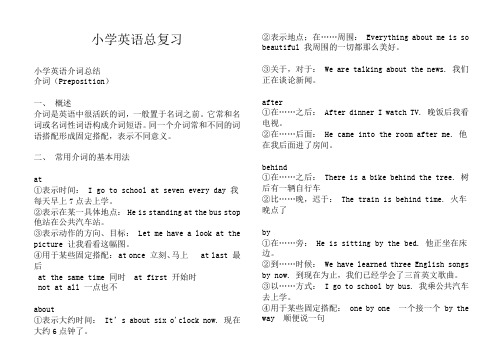
小学英语总复习小学英语介词总结介词(Preposition)一、概述介词是英语中很活跃的词,一般置于名词之前。
它常和名词或名词性词语构成介词短语。
同一个介词常和不同的词语搭配形成固定搭配,表示不同意义。
二、常用介词的基本用法at①表示时间: I go to school at seven every day 我每天早上7点去上学。
②表示在某一具体地点: He is standing at the bus stop 他站在公共汽车站。
③表示动作的方向、目标: Let me have a look at the picture 让我看看这幅图。
④用于某些固定搭配: at once 立刻、马上 at last 最后at the same time 同时 at first 开始时not at all 一点也不about ①表示大约时间:It’s about six o'clock now. 现在大约6点钟了。
②表示地点;在……周围: Everything about me is so beautiful 我周围的一切都那么美好。
③关于,对于: We are talking about the news. 我们正在谈论新闻。
after①在……之后: After dinner I watch TV. 晚饭后我看电视。
②在……后面: He came into the room after me. 他在我后面进了房间。
behind①在……之后: There is a bike behind the tree. 树后有一辆自行车②比……晚,迟于: The train is behind time. 火车晚点了by①在……旁: He is sitting by the bed. 他正坐在床边。
②到……时候: We have learned three English songs by now. 到现在为止,我们已经学会了三首英文歌曲。
(完整版)小学六年级人教版英语总复习及知识点
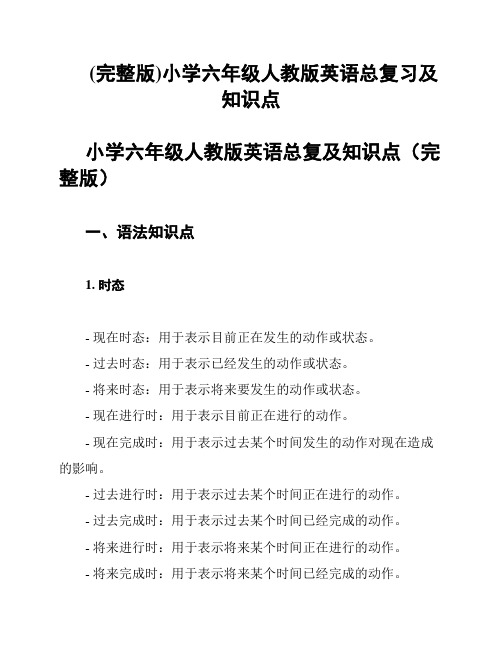
(完整版)小学六年级人教版英语总复习及知识点小学六年级人教版英语总复及知识点(完整版)一、语法知识点1. 时态- 现在时态:用于表示目前正在发生的动作或状态。
- 过去时态:用于表示已经发生的动作或状态。
- 将来时态:用于表示将来要发生的动作或状态。
- 现在进行时:用于表示目前正在进行的动作。
- 现在完成时:用于表示过去某个时间发生的动作对现在造成的影响。
- 过去进行时:用于表示过去某个时间正在进行的动作。
- 过去完成时:用于表示过去某个时间已经完成的动作。
- 将来进行时:用于表示将来某个时间正在进行的动作。
- 将来完成时:用于表示将来某个时间已经完成的动作。
2. 语法结构- 名词:用于表示人、动物、物体、地点等。
- 动词:用于表示动作或状态。
- 形容词:用于描述名词的特征或状态。
- 副词:用于修饰动词、形容词或其他副词。
- 介词:用于表示位置、时间或关系等。
- 代词:用于替代名词。
- 数词:用于表示数量。
- 冠词:用于限定名词的范围。
- 连词:用于连接词语、短语或句子。
3. 句子结构- 主语:句子中执行动作或承受动作的人或事物。
- 谓语:句子中说明主语动作或状态的部分。
- 宾语:句子中接受动作的人或事物。
- 定语:用于修饰名词或代词的成分。
- 状语:用于修饰动词、形容词、副词或整个句子的成分。
- 表语:用于说明主语的状态或特征的部分。
二、总复内容1. 单词- 请根据教材中的单词表,复并牢记相关的单词拼写和意思。
2. 句子- 复教材中的对话和句子,理解并掌握其基本意思和用法。
3. 对话- 复教材中的对话,掌握其中的日常生活用语和表达方式。
4. 语法- 复教材中的语法知识点,加深对时态、语法结构和句子成分的理解。
三、研究方法1. 多听多说- 多听英语教材、歌曲或英语广播,提高听力水平。
- 多说英语,练口语表达和语音准确性。
2. 多读多写- 多读英语教材、故事书等,提高阅读理解能力。
- 多写英语作文,锻炼自己的写作能力和语法运用。
小学六年级英语语法介词for的用法

小学六年级英语语法介词for的用法小学六年级英语语法介词for的用法介词 for 的用法小结1. 表示“当作、作为”。
如:I like some bread and milk for breakfast. 我喜欢把面包和牛奶作为早餐。
What will we have for supper? 我们晚餐吃什么?2. 表示理由或原因,意为“因为、由于”。
如:Thank you for helping me with my English. 谢谢你帮我学习英语。
Thank you for your last letter. 谢谢你上次的来信。
Thank you for teaching us so well. 感谢你如此尽心地教我们。
3. 表示动作的对象或接受者,意为“给……”、“对…… (而言)”。
如:Let me pick it up for you. 让我为你捡起来。
Watching TV too much is bad for your health. 看电视太多有害于你的健康。
4. 表示时间、距离,意为“计、达”。
如:I usually do the running for an hour in the morning. 我早晨通常跑步一小时。
We will stay there for two days. 我们将在那里逗留两天。
5. 表示去向、目的,意为“向、往、取、买”等。
如:Let’s go for a walk. 我们出去散步吧。
I came here for my schoolbag.我来这儿取书包。
I paid twenty yuan for the dictionary. 我花了20元买这本词典。
6. 表示所属关系或用途,意为“为、适于……的”。
如:It’s time for school. 到上学的.时间了。
Here is a letter for you. 这儿有你的一封信。
小学六年级英语介词用法及练习

介词用法及练习1、早、午、晚要用in例:in the morning 在早上in the afternoon 在下午in the evening 在晚上in the day 在白天2、at黎明、午、夜、点与分例: at dawn, at daybreak 在黎明时候at noon 在中午at night 在夜间at midnight 在午夜以上短语都不用冠词at six o'clock 在6点钟at 7:30 (seven thirty) 在7点半at half past eleven 在11点半at nine fifteen 在9点15分at ten thirty a.m. 在上午10点30分也可以写成seven to five 5点差7分(半小时以上) five minutes after two 2点过5分at a quarter to two 1点45分at the weekend 在周末3、年、月、年月、季节、周即在"来年",在"某月",在"某年某月",在四季,在第几周等都要用in。
在某年某月某日则用on例;in 1986 在1986年in 1927 在1927年in April 在四月in March 在三月in December 1986 1986年12月in July l983 1983年7月in spring 在春季in summer 在夏季in autumn 在秋季in winter 在冬季in the fist week of this semester 这学期的第一周in the third week 在第三周以及:in the bright sunlight 在明亮的阳光下 a merchant in disguise 乔装的商人the woman in white (black, red, yellow) 穿着白(黑、红、黄)色衣服的妇女in uniform 穿着制服in mourning 穿着丧服in brown shoes 穿着棕色鞋in his shirt sleeves 穿着衬衫5、将来时态in...以后after... (从过去开始)例: They will come back in 10 days. 他们将10天以后回来。
牛津译林版英语六年级下册小升初 介词专项复习资料 (含答案)
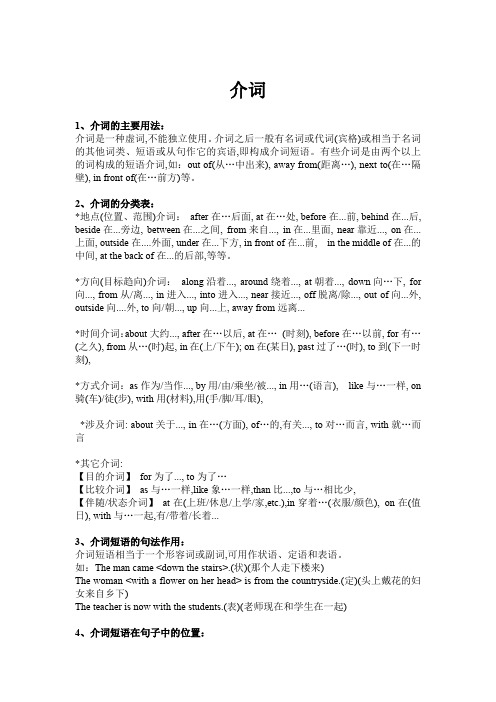
介词1、介词的主要用法:介词是一种虚词,不能独立使用。
介词之后一般有名词或代词(宾格)或相当于名词的其他词类、短语或从句作它的宾语,即构成介词短语。
有些介词是由两个以上的词构成的短语介词,如:out of(从…中出来), away from(距离…), next to(在…隔壁), in front of(在…前方)等。
2、介词的分类表:*地点(位置、范围)介词:after在…后面, at在…处, before在...前, behind在...后, beside在...旁边, between在...之间, from来自..., in在...里面, near靠近..., on在...上面, outside在....外面, under在...下方, in front of在...前, in the middle of在...的中间, at the back of在...的后部,等等。
*方向(目标趋向)介词:along沿着..., around绕着..., at朝着..., down向…下, for 向..., from从/离..., in进入..., into进入..., near接近..., off脱离/除..., out of向...外, outside向....外, to向/朝..., up向...上, away from远离...*时间介词:about大约..., after在…以后, at在…(时刻), before在…以前, for有…(之久), from从…(时)起, in在(上/下午); on在(某日), past过了…(时), to到(下一时刻),*方式介词:as作为/当作..., by用/由/乘坐/被..., in用…(语言), like与…一样, on 骑(车)/徒(步), with用(材料),用(手/脚/耳/眼),*涉及介词: about关于..., in在…(方面), of…的,有关..., to对…而言, with就…而言*其它介词:【目的介词】for为了..., to为了…【比较介词】as与…一样,like象…一样,than比...,to与…相比少,【伴随/状态介词】at在(上班/休息/上学/家,etc.),in穿着…(衣服/颜色), on在(值日), with与…一起,有/带着/长着...3、介词短语的句法作用:介词短语相当于一个形容词或副词,可用作状语、定语和表语。
小学六年级介词的常见用法归纳与解析

小学六年级介词的常见用法归纳与解析介词是英语中一种非常重要且常用的词类,它用来连接名词、代词、动词、形容词和副词等,起到表示位置、方向、时间、原因等等的作用。
在小学六年级的学习中,理解和正确运用介词是非常关键的。
本文将介绍小学六年级常见的介词用法以及对其进行分析和解析。
一、表示位置和方向的介词1. in介词"in"表示在某个范围、区域内,常用来指示地点或位置。
例如:in the classroom(在教室里)、in the park(在公园里)2. on介词"on"用来表示在某个表面或较大的平面上。
例如:on the table(在桌子上)、on the floor(在地板上)3. at介词"at"用来表示确切的位置或地点,通常用在某个建筑物或公共场所名称之后。
例如:at the bus stop(在公交车站)、at the library(在图书馆)4. into介词"into"表示进入某个地点或物体。
例如:jump into the water(跳进水中)、walk into the house(走进房子)5. out of介词"out of"表示从某个地方或物体出来。
例如:get out of the car(从车里出来)、take the book out of the bag (把书从包里拿出来)二、表示时间的介词1. at介词"at"用来指示具体的时间点。
例如:at 7 o'clock(在7点钟)、at noon(在中午)2. on介词"on"用来指示具体的日期或星期几。
例如:on Monday(在星期一)、on May 1st(在5月1日)3. in介词"in"用来指示一个时间段或某个月、季节、年代。
例如:in the morning(在早上)、in winter(在冬天)三、表示原因和目的的介词1. for介词"for"表示为了某个目的或原因。
小学英语六年级语法--介词
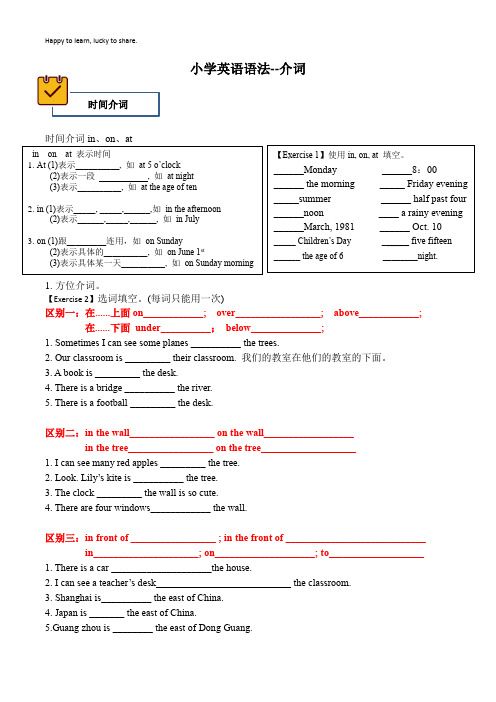
小学英语语法--介词时间介词in 、on 、at1. 方位介词。
【Exercise 2】选词填空。
(每词只能用一次)区别一:在......上面on____________; over_________________; above____________;在......下面 under__________; below______________;1. Sometimes I can see some planes __________ the trees.2. Our classroom is _________ their classroom. 我们的教室在他们的教室的下面。
3. A book is _________ the desk.4. There is a bridge __________ the river.5. There is a football _________ the desk.区别二:in the wall_________________ on the wall__________________in the tree_________________ on the tree___________________1. I can see many red apples _________ the tree.2. Look. Lily’s kite is __________ the tree.3. The clock _________ the wall is so cute.4. There are four windows____________ the wall.区别三:in front of _________________ ; in the front of ____________________________in_____________________; on____________________; to___________________1. There is a car ____________________the house.2. I can see a teacher’s desk___________________________ the classroom.3. Shanghai is__________ the east of China.4. Japan is _______ the east of China.5.Guang zhou is ________ the east of Dong Guang.in on at 表示时间 1. At (1)表示__________, 如 at 5 o’clock (2)表示一段 , 如 at night (3)表示__________, 如 at the age of ten2. in (1)表示_____, _____,______,如 in the afternoon (2)表示______,_____,______, 如 in July3. on (1)跟_________连用,如 on Sunday(2)表示具体的__________, 如 on June 1st(3)表示具体某一天__________, 如 on Sunday morning【Exercise 1】使用in, on, at 填空。
小学六年级英语汇总介词
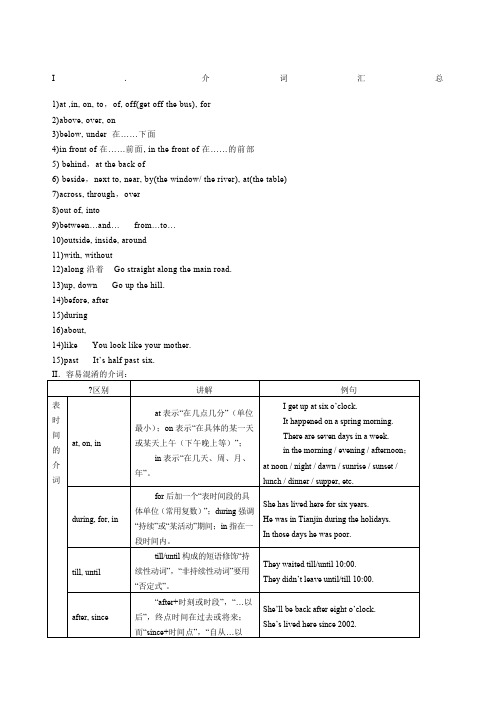
I.介词汇总1)at ,in, on, to,of, off(get off the bus), for2)above, over, on3)below, under 在……下面4)in front of在……前面, in the front of在……的前部5) behind,at the back of6) beside,next to, near, by(the window/ the river), at(the table)7)across, through,over8)out of, into9)between…and… from…to…10)outside, inside, around11)with, without12)along沿着Go straight along the main road.13)up, down Go up the hill.14)before, after15)during16)about,14)like You look like your mother.15)past It’s half past six.1.表示地点位置的介词1)at ,in, on, to,forat (1)表示在小地方; (2)表示“在……附近,旁边”in (1)表示在大地方; (2)表示“在…范围之内”。
on 表示毗邻,接壤,“在……上面”。
to 表示在……范围外,不强调是否接壤;或“到……”2)above, over, on 在……上above 指在……上方,不强调是否垂直,与below相对;over指垂直的上方,与under相对,但over与物体有一定的空间,不直接接触。
on表示某物体上面并与之接触。
The bird is flying above my head.There is a bridge over the river.He put his watch on the desk.3)below, under 在……下面under表示在…正下方below表示在……下,不一定在正下方There is a cat under the table.Please write your name below the line.4)in front [frant]of, in the front of在……前面in front of…意思是“在……前面”,指甲物在乙物之前,两者互不包括;其反义词是behind (在……的后面)。
小学六年级介词知识点总结

小学六年级介词知识点总结介词是连接词组和词组之间关系的词语,在句子中起到指示、描述、修饰等作用。
介词通常位于名词、代词或动词之前,用来说明地点、时间、方式、原因等概念。
在小学六年级的英语学习中,介词是一个重要的语法知识点。
下面是关于小学六年级介词知识点的总结:一、常见的介词:1. in(在):用于表示在某个地方或某个固定的位置,如in the park(在公园)。
2. on(在、在上面):用于表达在接触面或垂直面上的位置,如on the table(在桌子上)。
3. at(在、在...处):用于表示在一个地点,如at school(在学校)。
4. under(在...下面):用于表示在某物的下方,如under the table(在桌子下面)。
5. next to(紧挨着、在...旁边):用于表示某物在另一物体的旁边,如next to the park(在公园旁边)。
6. between(在...之间):用于表示两个物体之间的位置关系,如between the trees(在树木之间)。
7. behind(在...后面):用于表示某物在另一物体的后方,如behind the house(在房子后面)。
8. in front of(在...前面):用于表示某物在另一物体的前面,如in front of the car(在汽车前面)。
9. among(在...之中):用于表示在一群物体中的位置,如among the flowers(在花中间)。
10. with(与...一起):用于表示携带或陪伴关系,如go to the park with my friends(和我的朋友一起去公园)。
二、介词的使用规则:1. 表示地点:介词in用于大的地点,如国家、城市等;介词on用于具体的表面,如桌子、地图等;介词at用于具体的场所,如学校、商店等。
2. 表示时间:介词in用于年、季节;介词on用于具体的日期或星期;介词at用于具体的时刻。
英语介词-英语六年级介词p_2022年学习资料

一时间介词-1,in-用于较长一段时间:表年份,月份,季节,朝代,世-纪或非特指的早、午、晚等。-1988 in March、in1-winter、in the21st-century、in Tang Dynast 、in the day、in the-morning-on-具体某一天或具体某一个早、午、晚-on Mon ay、on Saturday evening、on the May-seventh,on a windy ight-在某一点时间或某个瞬间-at eight o'clock、at the end of、at th s moment、-at this time,at the age of-注意:at noon-在中午-a night在夜间
三,方位介词-1,in-在某范围之内-to-on与某地相邻、接壤-1.China lies-the eas of Asia and-north of Australia.-A.in,onin,to C.to,in 2.Mongolia is t-the north of China.-☆n
in-里面,排、行、组-2.-on-左、右边-at-前、后部-1.We are Team One.I si the front of-the classroom.Li Ping ismy left.-A.on,i ,at B.in ,in ,at in,at,on-2.I have a good seat.I sit he bus.-☆in the front of-B.in front of-3.The teacher s standing our clห้องสมุดไป่ตู้ss-and give a talk.-☆in front of
- 1、下载文档前请自行甄别文档内容的完整性,平台不提供额外的编辑、内容补充、找答案等附加服务。
- 2、"仅部分预览"的文档,不可在线预览部分如存在完整性等问题,可反馈申请退款(可完整预览的文档不适用该条件!)。
- 3、如文档侵犯您的权益,请联系客服反馈,我们会尽快为您处理(人工客服工作时间:9:00-18:30)。
Day3 Name:
小学英语介词总结
at
①表示时间: I go to school at seven every day 我每天早上7点去上学.
②表示在某一具体地点: He is standing at the bus stop 他站在公共汽车站.
③表示动作的方向、目标: Let me have a look at the picture 让我看看这幅图.
④用于某些固定搭配: at last 最后 at the same time 同时 at first 开始时 not at all 一点也不
for
①为,给,替: I'll make a card for my teacher. 我要给老师做张卡片.
②由于: Thank you for helping me. 谢谢你帮我.
③表示给(某人)用的: There is letter for you. 这儿有你一封信.
in
①在……里面: The pencil is in the desk. 铅笔在课桌里.
②在一段时间里: We have four classes in the morning. 我们上午有四节课.
③用,以: What's this in English? 这用英语怎么说?
④在某一年份,季节,月份: in 2002, in spring, in January
⑤表示状态,服饰: Helen is in yellow. 海伦身穿黄色衣服.
⑥在……方面: He is weak in English. 他的英语不行.
⑦用于某些固定搭配: in front of 在……前面 in the end 最后
on
①在……上面: There are some apple on the tree. 树上有些苹果.
②在(星期)天,在某天的上午(下午,晚上): They go to English class on Sunday. 星期天他们去上英语课.
I left Beijing on the morning of May 1. 我在5月1日早上离开北京.
③用于某些固定搭配: on duty 值日 on time 准时
介词的固定搭配
1)介词和名词的连用 2)动词和介词的连用
at first 起初;开始 get off 下车at last 最后 help sb. with sth. 帮组某人做某事
at school 在上课,在上学 ask for 请求get up 起床 at home 在家;无拘束
laugh at 嘲笑 learn from 向……学习 at work 上班,在工作 look after 照顾
look for 寻 listen to 听 on holiday 度假 look at 看;注视 talk about 交谈;谈 on the left/right 在左/右边 wait for 等候;等 thank for 为……而感谢
on foot 步行 on sale 出售;降价出售
3)形容词和介词连用
on TV 在电视上播放 be afraid of 害怕 be interested in 对……感兴趣 be good at 擅长……
in class 在课堂上 be late for 干某事迟到 in English 用英语 be good for 对……有利
4)其他
by+交通工具by bus/train/plane/air/ship/bike/sea… in bed 躺在床上 lots of/a lot of 许多,大量练一练:
1、选用括号内恰当的介词填空。
1) What’s this _______ ( at, on, in ) English?
2) Christmas is _______ ( at, on, in ) the 25th of December.
3) The man_______ ( with, on, in ) black is Su Hai’s father.
4) He doesn’t do well _______ ( at, on, in ) PE.
5) Look at those birds _______ ( on, in ) the tree.
6) We are going to meet _______ ( at, on, in ) the bus stop _______ ( at, on, in ) half past ten.
7) Is there a cat _______ ( under, behind, in ) the door?
8) Helen’s writing paper is _______ ( in, in front of ) her computer.
9) We live _______ ( at, on, in ) a new house now.
10) Does it often rain _______ ( at, on, in ) spring there?
2、圈出下列句子中运用不恰当的介词,并将正确的答案写在横线上。
1) Jim is good in English and Maths.
2) The films were in the ground just now.
3) They are talking to their plans.
4) How many students have their birthdays on May?
5) I can jog to school on the morning.
6) Did you water trees at the farm?
7) Can you come and help me on my English?
8) I usually take photos in Sunday morning.
二、用所给的介词填空。
2. We could buy hamburgers _______ lunch.
3. I help my mother ______ the housework.
4. You can come and have dinner ______ us.
5. I drawed a picture _______ horses.
6. Bill is a heavy boy _______ short hair.
7. Adults usually give lucky money to children _______ Spring Festival.
8. It’s a postcard(明信片) __________ the USA.
9. I live _________ the eighth floor.
11. Are you listening ________ me?
12. We usually stay ________ home ______ Saturday afternoon.
13. Shall we meet _______ the gate(大门) _______ the school?
14. Don’t walk _______ the grass.
15. Some children are swimming _______ the river(河).。
